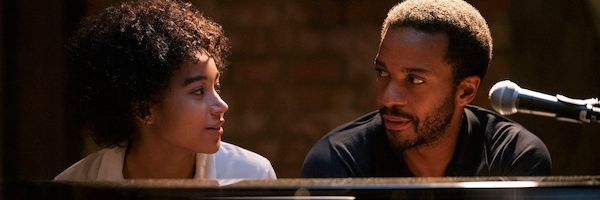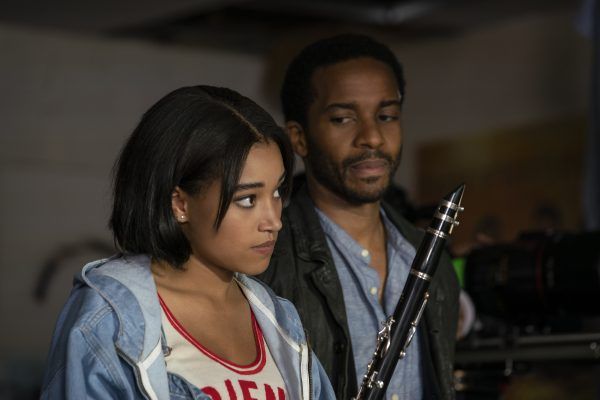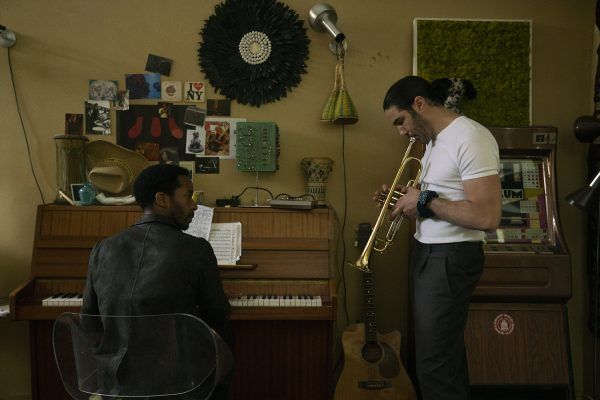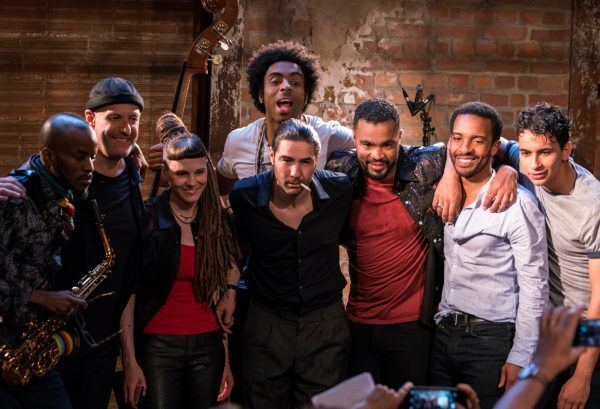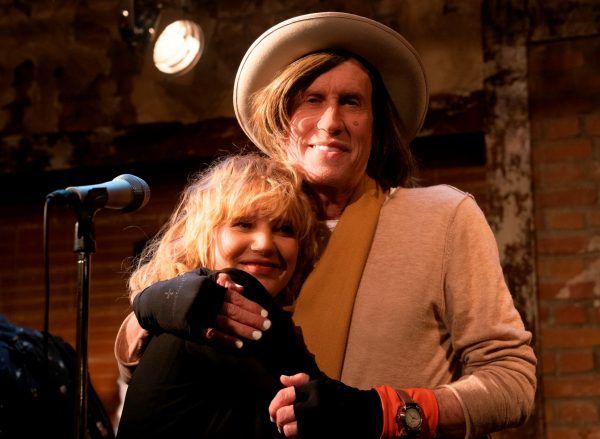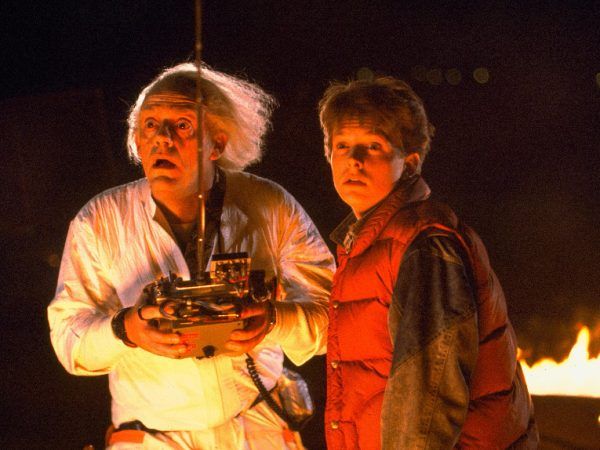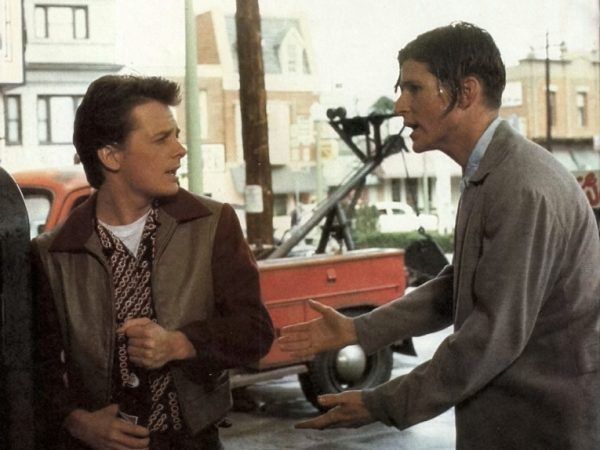The eight-episode Netflix drama The Eddy explores life in multi-cultural neighborhoods of modern-day Paris, which includes the struggling nightclub The Eddy and its house band, fronted by lead singer Maja (Joanna Kulig) and club co-owner Elliot Udo (André Holland). With a business partner that may be involved in some questionable practices, secrets coming to light, and family struggles, Elliot has to find a way to save the club and sort out his life.
During this 1-on-1 phone interview with Collider, executive producer Glen Ballard talked from Paris about how this project is a dream come true for him, how Netflix took a chance on his idea, the importance of putting together a real band that could play live throughout the series and for the accompanying soundtrack. He also explores why they wrote the music first and then hired a writer to develop the scripts around that, assembling the creative team, which includes filmmaker Damien Chazelle, showing a different side of Paris to the show’s viewers, and how the finished product exceeded all of his expectations. He also talked about the next TV series he’s developing, called Decade, and how he came to work on the music for the Back to the Future musical (which had to cut its run short due to COVID-19), and his hopes that they’ll be back on stage in London next year.
Collider: As a lifelong music fan, I found this series fascinating, on so many levels.
GLEN BALLARD: Oh, thank you. I think music is important, too.
Even though I knew your work and just didn’t realize it, the first time I became familiar with your name was when you did Jagged Little Pill with Alanis Morissette, which was such a fantastic album and is pretty firmly on my list of greatest records of all time. This show is a very different kind of project that showcases a very different kind of music. How did the idea for this come about, for you? Was it jazz music that made you want to do something like this?
BALLARD: It’s actually a dream come true for me, because I’ve wanted to do a jazz project and write jazz songs. The first major record that I ever had recorded was by a great jazz artist named George Benson in 1980, and Quincy Jones produced the record. It was a song called “What’s on Your Mind?,” and it’s a jazzy song, not a jazz song. And so, I met Quincy in 1980, and Quincy himself, is one of the great jazz refugees. He started in jazz and ended up being one of the great pop producers of all time, and he’s made his connection between jazz and hip-hop. So, this was, for me, always a dream.
In my adult life, I’ve lived in Paris a lot, and I’ve always had a dream of having this connection to Paris. I found out recently that I’m 37% French, so now I understand why. So, for me, it started with the connection to Paris, and I wanted to write these jazz songs. I went through my whole pop career. I worked with Quincy in the ‘80s, and I wrote the song “Man in the Mirror.” I worked with Michael Jackson a lot, and I worked with a bunch of the artists that Quincy was working with. And then, I went out on my own and did all kinds of music, but I always had this dream of doing a jazz band in Paris. I had my own place [in Paris] in the ‘90s, in the very neighborhood I’m in now.
I would go out and listen to jazz in these tiny clubs, and there would be young people in the audience, listening to people playing jazz, and I thought, “Jazz never really died here. It would be fun to think of how, in my own life, my fantasy would be to have my own band in Paris, in a little club, and I’d get to write my own songs for it.” And that’s what this whole thing turned out to be. I’m just enormously grateful that Netflix would embrace this concept, and the concept of us doing live music in a TV show. You always put the music in later, and it’s canned and people are faking it, but we have real music in every episode. Netflix went the extra mile with this. What you have is a series where you have real music being played, and then there’s not a whole lot of other music. It’s about what their real life is like. It’s a huge dichotomy between lots of music and no music.
It seems like this would have been a really hard sell, or an impossible sell, to a network. Does it feel like this series really only exists because of a streaming service like Netflix?
BALLARD: There’s no question, this was all about Netflix taking a chance on this idea. This is coming out of Netflix France and Netflix Europe. This is not an American show. It’s a French show, really. It’s intended to have an international audience and, quite frankly, the international audience for jazz is bigger than it is in the U.S. But this is really not about jazz. For me, it was always about trying to find a story that would be interesting enough for people to come into this mythical club, called The Eddy, and hear and follow what these musicians go through, just as artists, to play music that they love to play and that they’ve trained their entire lives to play, and they’re not gonna get famous from it, certainly not in 2020. It’s about that passion. That’s who these characters are. But more than anything, I’m just gratified that Netflix would allow us to do it live. We had this incredible international jazz band, with a female drummer from Croatia, a bass player from Cuba, a sax player from Haiti, a piano player from California, a trumpet player from Paris, and a singer from Poland. They’re a real band now. We played live music on the set, every day for ten months, and they just became a family. I love this band. They’re ready to go play now, but we’re all in quarantine.
Was this one of those experiences that was hard to say goodbye to, when it was over for the season?
BALLARD: It’s Helsinki syndrome, where you begin to love your captivity and you find ways to accommodate it. We were making music, all day, every day, and the musicians were exhausted, the crew was exhausted, and we were all exhausted. Having that added element of the music happening gave everyone some extra inspiration. Netflix essentially built a club for me. It was my fantasy club, and we put a recording studio behind the stage, so that everything we did in there was really well recorded. We have this concert footage and a good recording of it, and it’s the perfect combination. That’s the way Damien [Chazelle] approached it, as a director. It’s a concert and you really feel how wonderful it is to have real people playing music. They’re all doing their own thing, but it’s all together. It’s a portrait of what jazz can be. I don’t want people to have to know what the song is because then you have to look back. I just wanted it to be about this new, fresh take on what jazz could be in Paris right now. It’s multi-cultural. It’s just a dream come true for me, as a songwriter, to be able to fulfill this part of my artistic destiny. We wrote 60 songs for this and (screenwriter) Jack Thorne took a lot of those and wrote eight episodes, and used the songs and used them throughout every episode.
Had you thought about what you would do with all of those songs, if a series had never come to be? Would they have just lived as albums?
BALLARD: Well, no. It’s been a very long road. I wrote the first one of these in 2007. But not for one minute did I ever consider not having this companion to go with it. I knew that to just put out a bunch of new jazz songs without having this narrative companion to go with it would be dropping them into the ocean. We had a couple of false starts with this. At one point, we went with a different network and we didn’t know if it was gonna happen, but we never once considered releasing this music without the show. We believed that it could be the fuel for this whole idea of a jazz band in Paris, and I’m glad we waited and that it all came through. The album is available now and we have 16 songs that were recorded on the show, with four encore performances. One is from this exciting new singer named Georgia Smith, one is from St. Vincent, and one is from our original singer, named Julia Harriman. The album is a great companion to go with the show.
What was it like to put together the creative team for this series, and then see how it started to develop with the writing, and with the directors and their vision for the episodes?
BALLARD: It started with me bringing about 50 jazz songs to Alan Poul, who directed Episodes 7 and 8, and he’s one of our executive producers. Alan Poul is the reason the whole show got made. That was 2013. I gave him all of these jazz songs and told him the concept of a jazz band in Paris, and a few months later, he called me up and said, “I think I have a young director. I just saw a short film of his, called Whiplash. His name is Damien Chazelle, and I think we should get him involved.” And so, we met with Damien, he heard the music and the band, and he signed on around 2014. Then, he went off and made a movie, called La La Land. Then, he went off and made another movie, First Man. He’s been involved with this project for quite some time. This is not a riff on La La Land. This was already its own project, and it’s tone is much more Whiplash than La La Land.
Once we had Damien on board, we got so lucky to get Jack Thorne, who’s this incredible writer for stage, television and movies, and he came and saw the band, as it was presently constituted in Hollywood. We gave him 39 of The Eddy songs, and he went out and wrote eight episodes, using our songs as the subtext for each episode and putting the songs all over it. He created all of these characters and stories, and he created speaking roles for everybody in the band. We were terrified because we knew that our band had never really acted, but he had confidence that a jazz musician could pull it off. I think they all did a beautiful job. They’re not trained actors, but it feels real to me. All of our great actors on the show, really helped our band into this whole arena of acting. We were doing the live music, so they always felt like they were doing what they do.
It’s ‘really quite an unusual thing to have this many non-actors, which really gives it a sense of it being real. You’re around the real deal. Jazz musicians are always fascinating characters, in their own right, and this band is no different. Everybody has their own personality, and they just fit beautifully. As the episodes went on, they got more and more involved. I’m so proud of the band. And of course, we have our great cast of really great actors, with Amandla Stenberg, Andre Holland, Joanna Kulig, Leïla Bekhti and Tahar Rahim. It’s an all-star cast, and we have all of these musicians in there with them, holding their own. It was really good.
What was it like for you to see the episodes and to see how the music was used? Did you feel like it was exactly what you had hoped it would be, or was it different, in any way?
BALLARD: Honestly, it exceeded all of my expectations. Jack Thorne used our songs and integrated them into the whole fabric of the show. I’m so humbled by how beautifully he took our work and turned it into something. So, in every way, it exceeded all of my expectations, from the story to the directors that we had involved to the actors that we were able to get. We thought it would be magic to get people playing music over an eight-episode series, and I think we did that. On every level, this is a real band and they really play music, and they’re really, really good. On every level, I was happy with the energy and the performances. I couldn’t be prouder of all of it. Seeing it come to life, it exceeds all of my expectations.
In what ways do you hope that this series not only gives audiences exposure to jazz, but gives them a different view of Paris?
BALLARD: The Paris that everybody knows about, where all of the monuments are in the center of Paris and some famous jazz clubs are, we don’t show any of that in the show. There’s a road that goes around Paris, called the Ring Road, that’s the dividing line. A lot of the characters in our show live above the Ring Road because they’re jazz musicians and they can’t afford to live in the nice parts of Paris, and our club is right on the border. Paris is multi-cultural. That’s why we have a couple of young characters who are Muslim, but who are playing jazz music. They work in the club, and they’re caught between worlds. The owner of the club’s family are devout Muslims, but he’s running a jazz club and he’s doing some things that maybe aren’t so completely legal. So, this show is about how these cultures come into conflict. This is the new Paris, musically, culturally and dramatically, and that’s all reflected in the show. It’s a really deeply international show, and it’s a different side of Paris. It’s not people with cigars, cigarettes and cigarette holders, in berets who are walking around. It’s a different Paris, but it’s still so Parisian. Paris has this sense of embracing all kinds of cultures, and still feeling Parisian. We shot all over Paris, outside of the Ring Road, in some of these areas that people don’t know about, and it was actually fun and exciting to shoot there. We were running around Paris like crazy, with this incredible crew. It was an exciting shoot. I’ve been working on this for 14 months.
I love how varied your career is, from Michael Jackson to Alanis Morissette to jazz music, and even doing the music for the Back to the Future musical. I mean it seems like those, none of those things you would think would be done by the same person. Has that eclectic variety in your work been intentional?
BALLARD: Yeah, and I’m blessed that I was able to do it. I grew up with so many different influences, growing up in Mississippi and going to New Orleans, all the time, as a child, and then spending a lot of time in New Orleans, around that music. I was also heavily influenced by R&B music and pop music. The Beatles blew my mind. As a songwriter, I just wanted to write whatever I could write. I’m fluent enough, musically and lyrically, to be able to do that, and I never got typecast. Just when people think they know what I’m doing, I’m doing something else.
Musical theater has been something that I’ve really wanted to do. I directed my high school musical. And then, I left it for 40 years, but now I’m heavily involved with musical theater. We actually had Back to the Future running at the Manchester Opera House until March 14th. We had an incredible opening on March 11th, and it felt like a big hit show. When we emerge in London next year sometime, at whatever point we’re all able to go back into a theater and sit next to each other, or at least within 1.5 meters of each other, the show will go back up. And of course, we had Jagged Little Pill on Broadway, and that had to close. It’s been such a strange moment, but I just absolutely love musical theater. I’m continuing, heavily, with three other musical theater projects and I’m producing another one. As a songwriter, I feel a great affinity for the stage and I’m earning my way into it.
What was it about Back to the Future that made you want to write the music for that story and help bring that film to life, in a different way?
BALLARD: Well, mostly because of (composer) Alan Silvestri, (director) Bob Zemeckis and (screenwriter) Bob Gale. I had worked with all of them on a picture, called Polar Express. We wrote a lot of songs for that children’s Christmas movie, and we had fun doing it. I just loved working with Alan, Bob, and Bob, so I said, “Let’s try to turn this into a musical.” It was a challenge, at first, but about halfway into it, I realized that it’s actually made for the stage. Especially when you’re taking something like a movie and putting it on stage, it’s a huge process of figuring out what’s precious and what isn’t, and fortunately, we were working with the storytellers, so they were able to help us divest the movie elements from the story and still keep the story, and then put it on stage. Al Silvestri and I wrote 50 songs for it, and out of the smoke pit, we had 15 new songs that, in many ways, help tell the characters’ stories, but it’s the same story. It’s Back to the Future. We have DeLoreans disappearing and flying, and we have a huge emotional journey for all the characters. I’m really excited about it. I always knew that there was something special about the story, meeting your parents, and finding out that they might’ve not been telling you the straight truth. That just works beautifully on stage, and I can’t wait for everybody to see it, sometime next year in London.
It’s certainly a story that people have loved for a long time and have wanted to see more of, in some way, and that’s a cool way to give people something new, without making another movie.
BALLARD: I actually think this is the perfect companion to the movie. The guys said they’ll never do a remake of it, so this is it. In every way, it’s a very warm and friendly and fun companion to the movie. On so many levels, you see people do this right in front of you and it’s pretty magical. I’m really blown away with the production that we had. It would actually be closing next week, and we were gonna do a soundtrack album on the 17th of May, and all of that had to get canceled. We were just heartsick. We’ll record the soundtrack album, sometime early next year, right before we go into the theater. So, hope is not lost, but it’s been a daunting time for everyone, obviously. We had five workshops. We were in previews from February 20th, and on March 11th, we opened the show. It was a huge success with great reviews. And then, four days later, we were forced to shut. We were lucky to get that far with it because we got a London theater and were doing a show in Germany with it, too. Our show is intact, we still have all of the sets, and we still have our DeLoreans, so we’ll just wait it out, like everybody.
You talked about how you have all of these musical theater projects going, but would you also like to do another TV series, after having this experience?
BALLARD: Without question, and we have one in development, right now. It’s called Decade, and it’s about the 1995 record business in Los Angeles, which I was a big part of. That’s our very next project, and again, it’s music-driven. The music is essentially done, plus there’s the music from 1995.
Is that something that will be from one specific character’s point of view, or is it a bigger story?
BALLARD: There are several main characters. There’s the female head of a record company, there’s a limo driver, there are several artists, there’s a record company head whose record label has just been bought, there’s a head of promotion, and there’s a rehab center. It’s a portrait of the last great decade of the record business, when it was something else.
The Eddy is now available to stream on Netflix.

